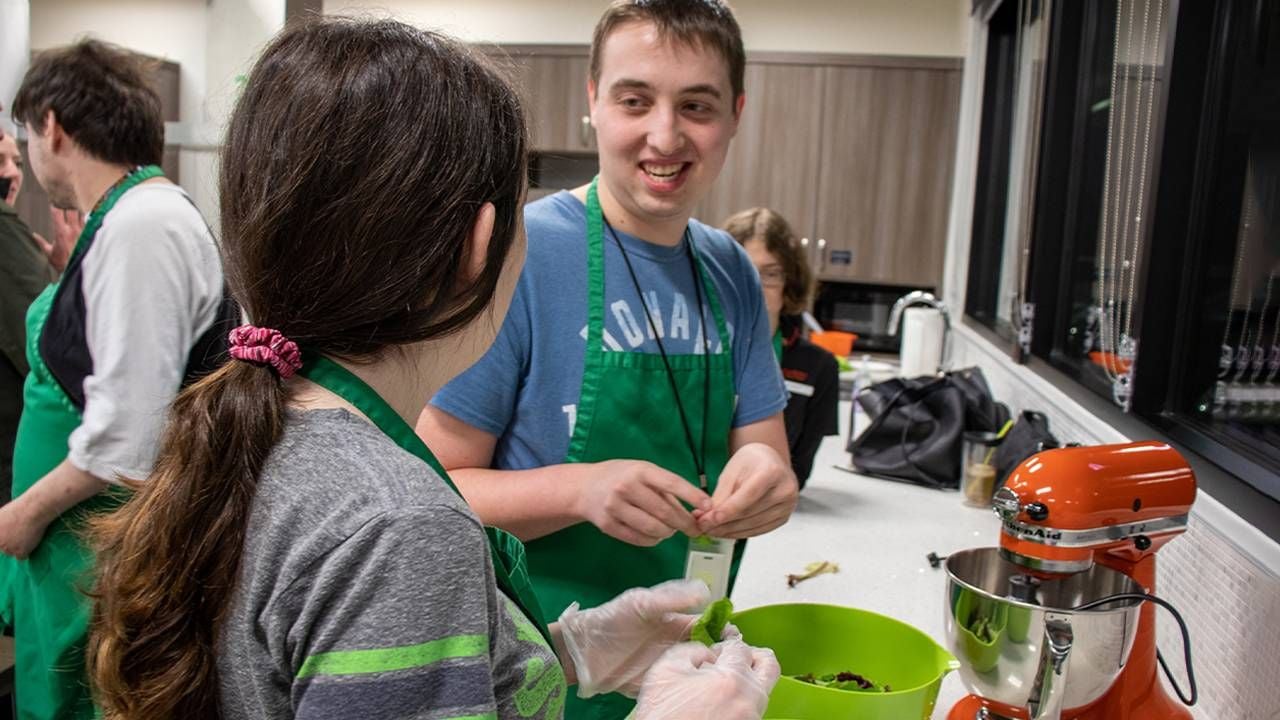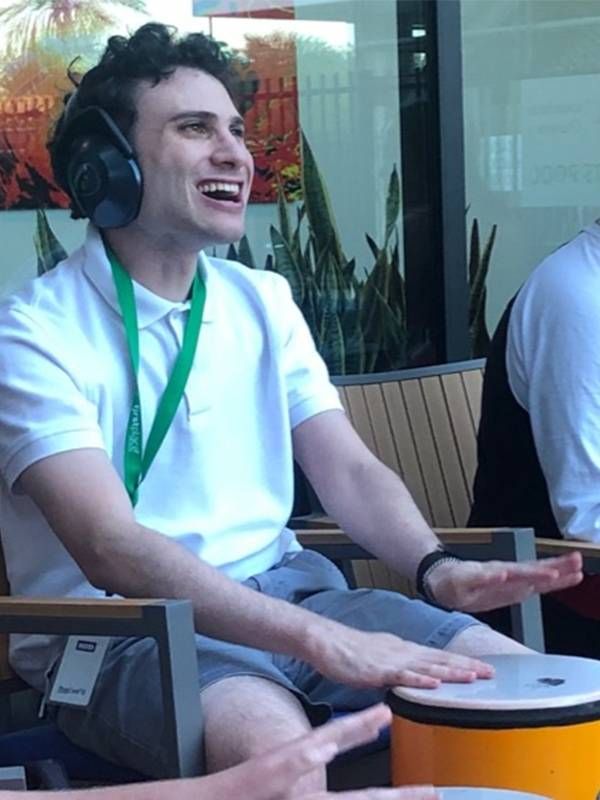Creating a Forever Home for Adults with Intellectual and Developmental Disabilities
Parents want the best for their children, so some parents are taking matters into their own hands
Ginger Pottenger remembers the day her daughter Kandi announced she wanted to move out of their house.

"I didn't see that coming," she says of Kandi, who is now 58 and has a moderate intellectual disability.
"Her younger sister was about to graduate high school and head off to college, and Kandi pulled me aside one day and said, 'I'm the oldest. Why is she going first? When do I get to go off into the world?'"
This was the early 1980s, says Pottenger, who lived in Wichita, Kan., at the time. The world was different then: less compassionate toward people with disabilities and with fewer programs and home- and community-based services available to help launch a person with Intellectual/Developmental Disabilities (I/DD) into the larger community.
"It became clear pretty quickly that keeping Kandi at home would have been simpler and less expensive, but she deserved the life she wanted."
Back then, it was often assumed that parents would outlive their disabled children; in the meantime, the adult child would stay at home with Mom and Dad.
According to a new study by the Morrison Institute for Public Policy, the population of adults with autism and other intellectual disabilities is growing. Between 2000 and 2016, the proportion of children diagnosed with autism has increased from 1 in 150 to 1 in 54.
Nearly 50,000 autistic teenagers graduate from high school each year; thanks to medical advances, these young adults have a life expectancy similar to that of the general population and will require housing and support services over the course of their lives.
The passage of the Americans with Disabilities Act in 1990 was key in empowering people with I/DD and their advocates, creating better access to early intervention and educational support and helping them join their local communities in independent living situations.
And thanks to advocacy organizations, parents can learn to help their adult children find their place in the world; to discuss their own mortality; and to provide for their kids financially after they're gone.
The Old Days Weren't the Good Old Days
Forty years ago, when her daughter wanted to move out, Pottenger didn't have such services.
She learned to punt.
"There wasn't a lot of support or many programs in place to help parents figure these things out," Pottenger remembers, who lives in Sun City, Ariz., these days. "But by then I'd been advocating for my daughter for a while, and I figured it out."
Kandi wanted to go to college and get a job and be part of the world, and Pottenger was determined to provide that.
"It's getting better. But it's still not easy to find community inclusion and permanent homes for people with I/DD."
"I had to figure out not only how to provide this, but to make sure it continued after I was gone. It became clear pretty quickly that keeping Kandi at home would have been simpler and less expensive, but she deserved the life she wanted, just like anyone else could have."
Instead of a traditional college, Pottenger arranged for Kandi to attend a vocational training school, where she learned how and why to support herself financially. After that, in an era when independent living options were limited for the I/DD community, Kandi lived in a series of group homes.
"It was exhausting and difficult and ultimately very worth it," Pottenger says. Today, her daughter works at a local grocery store and lives in the next town over from her mom. Yet 40 years later, many of the challenges Pottenger faced getting Kandi settled are still there.
"It's getting better," according to Jon Meyers, the former executive director of The Arc of Arizona. The Arc is nation's oldest and largest I/DD advocacy rights organization with more than 600 chapters in the U.S. "But it's still not easy to find community inclusion and permanent homes for people with I/DD."
The norm used to be that a child with I/DD would go live with another family member once their parents were deceased, Meyers says.
"But that option turns up more rarely today because people tend to move more often and don't live in the same town as their parents. Without a clear commitment from a family member, once the parents are gone it can come down to the person with I/DD having no choices," he says.
When Mom and Dad Are Gone
It doesn't help that parents often keep mum about the hard stuff.
"No one likes to discuss their mortality," Meyers says, "but we recommend that parents talk to kids with I/DD about the fact that one day Mom and Dad will be gone. It's not a simple conversation. But without it, the life of that grown child can be thrown into turmoil if the parent they live with dies. It's not fair to the disabled person not to prepare them for that possibility."
Toward that end, the Arc has established an online "Build Your Plan" tool to help parents launch their I/DD adult child. The program considers key areas in independent living, like how far to live from Mom and Dad, which support communities provide what services, and whether the facility or apartment complex offers onsite support.
"If parents die and no guardian is named in their will, guardianship usually falls on the state."
Meyers cautions families against what he calls "intentional communities," planned congregate settings for people with I/DD. He's toured several in various American cities that sell themselves as accessible and staffed with trained professionals who can help guide their I/DD population.
"But they're not," he says. "Many are designed to look like communities but are really just a place with lots of residents with I/DD living together who have no contact with the larger community around them."
He found one such place in Florida that, like many similar private-pay facilities, promoted itself as assisting residents in getting to school or work.
"But then the residents come home to a community of other people with I/DD, because there's no support staff living there. To us, that looks like segregation. There's no lift for the swimming pool or other wheelchair-accessible functions. Finally, it's expensive, which excludes some people from living there," Meyers says.
Get it in Writing
To ensure that people with I/DD end up in the proper setting after parents die, Meyers says, it's important to put the details in writing.
"If parents die and no guardian is named in their will," he cautions, "guardianship usually falls on the state. In such cases, people with I/DD can be placed in group homes or care facilities that aren't a good fit."
Phoenix-based Denise Resnik knows about facilities that don't fit well.
"After I toured a few potential homes that I/DD professionals thought my son Matt could be placed, I ran away as fast as I possibly could," says Resnik.
Seeing her son steered toward badly planned housing changed Resnik. She vowed to find a better way of life for people like Matt, who has autism spectrum disorder. She co-founded the Southwest Autism Research and Resource Center (SARRC) in 1997, and in 2018 opened First Place AZ, a supportive housing complex for adults with neurodiversities that she calls "a consumer-controlled property."
Matt, who's now 30, is a resident.
"The model we've created provides around-the-clock support to residents," Resnik explains. "But it's support that's individualized to each person, sort of a concierge system."

Unlike some of the facilities Meyers has seen, First Place is built around an on-call approach to providing care to I/DD residents. Its staff is trained to provide as much or as little assistance to community members as they need, everything from medication monitoring to rides to and from a doctor's office.
A series of studies and development concepts followed First Place's launch, as the group sought more hopeful options for people with I/DD. The result is a new wave of financially sustainable housing solutions created by private, public, and nonprofit collaborations.
Resnik believed that the final piece of the forever-home puzzle was to create well-trained support teams for I/DD adults living on their own. In 2012, she founded the First Place Global Leadership Institute to, among other things, train professional support staff and medical personnel to help run I/DD communities.
"Today, we have licensed curriculum for special learners to more than ten organizations across the country and are consulting on new housing projects in Nebraska, Florida and New Jersey," Resnik says. "We share our knowledge to support others in developing properties that reflect the culture of the greater local community."
Let Them Know It's OK to Go
"I learned the best thing you can do is encourage your kid to leave home, if that's what they want," Pottenger says. "If I hadn't, Kandi would have stayed at home. But I always wanted her to be as independent as she could be with the support I knew she'd need out there."
Kandi lived in three group homes before she was able to move into her own place with support. After Pottenger moved to Arizona in 1999, she bought a townhouse and put it in a special needs trust for her daughter.
"I wanted to make sure she'd never get evicted from any place," she says with a laugh. "And with me as her landlord, and with this trust in place after I'm gone, that won't happen."
Pottenger thinks sometimes about that first night without her daughter at home more than four decades ago.
"It really hit me she was leaving when I took her over to her new place with all her stuff in my car," she recalls. "Someone had told me it was a good idea not to call your kid for the first few weeks after they moved out, and I went back home and I was sitting there thinking, 'How am I going to not talk to Kandi for two whole weeks?'"
While she was pondering this, the phone rang.
"It was Kandi," Pottenger says with a laugh. "She was calling to tell me how much she liked her new home, and how excited she was to be out on her own."
Take Matters Into Your Own Hands
Below are links to additional resources related to this story.


